The Trailblazers exhibition is also available as a standalone presentation on Microsoft Sway, featuring large images, animations and interactive navigation.
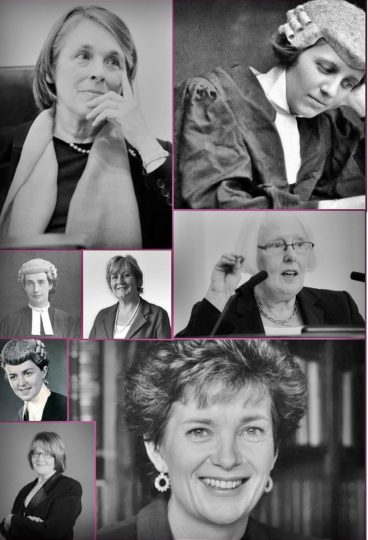
In November 1921 Averil Deverell and Frances Kyle were the first women to be called to the Irish Bar.
As we look over these first 100 years of women in the law, we recognise the achievements of all the trailblazers and the mark women have made on the legal landscape in Ireland.
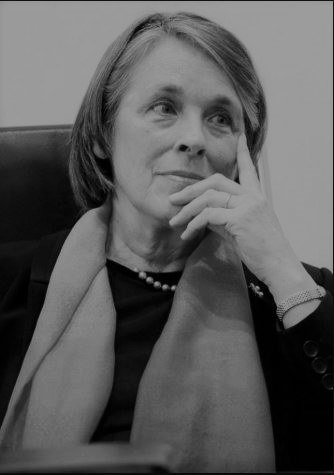
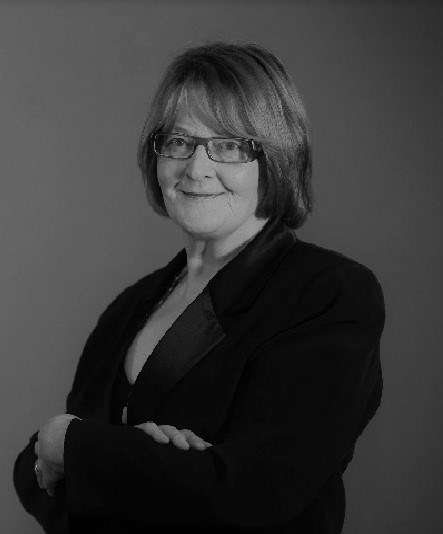
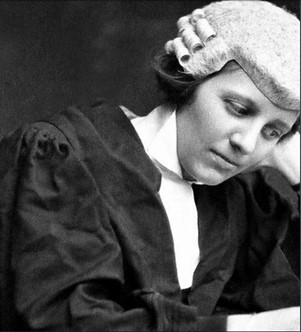
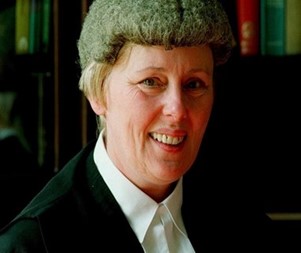
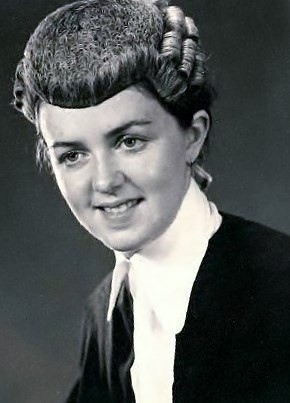
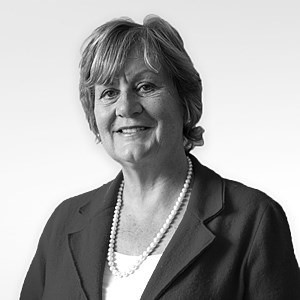
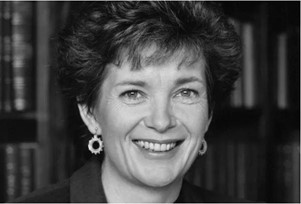
The First 100 Years
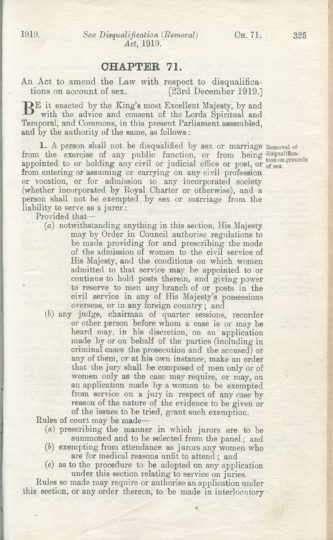
On the 23rd of December 1919 the Sex Disqualification (Removal) Act became law, an act that was the culmination of centuries of activism and advocacy asserting the rights of women within public and private life. What can be said to have begun with the publishing of ‘A Vindication of the Rights of Woman’ by Mary Wollstonecraft in 1792 continued through advocacy in the 19th century to protect the property rights of married women, allowed them to seek a decree of divorce, and ultimately brought us to the early 20th century and the suffrage movement.
Though the act did not lead to the full emancipation of women within society, there were still restrictions on women entering the civil service, who was entitled to vote and the types of cases they could serve on as jurors, it was an important step towards providing a public space for women to engage in professions they were previously excluded from, not least the legal profession.
Though the act did not lead to the full emancipation of women within society, there were still restrictions on women entering the civil service, who was entitled to vote and the types of cases they could serve on as jurors, it was an important step towards providing a public space for women to engage in professions they were previously excluded from, not least the legal profession.
“A person shall not be disqualified by sex or marriage from the exercise of any public function, or from being appointed to or holding any civil or judicial office or post, or from entering or assuming or carrying on any civil profession or vocation, or for admission to any incorporated society (whether incorporated by Royal Charter or otherwise), and a person shall not be exempted by sex or marriage from the liability to serve as a juror”
Sex Disqualification (Removal) Act 1919
Prior to the passing of the act women had made attempts to enter the profession, applying to the Law Society of Ireland and the Honorable Society of King’s Inns, but were repeatedly excluded, though no law formally forbade their inclusion. One such woman was Miss Weir Johnston who wrote to the King’s Inns Benchers in 1901 to enquire if a woman could become a member of the Irish Bar. The Under-Treasurer was directed by the Benchers to inform her that “it was not competent for a lady to enter this Inn as a student, or become a member of the Irish Bar. Ordered.”
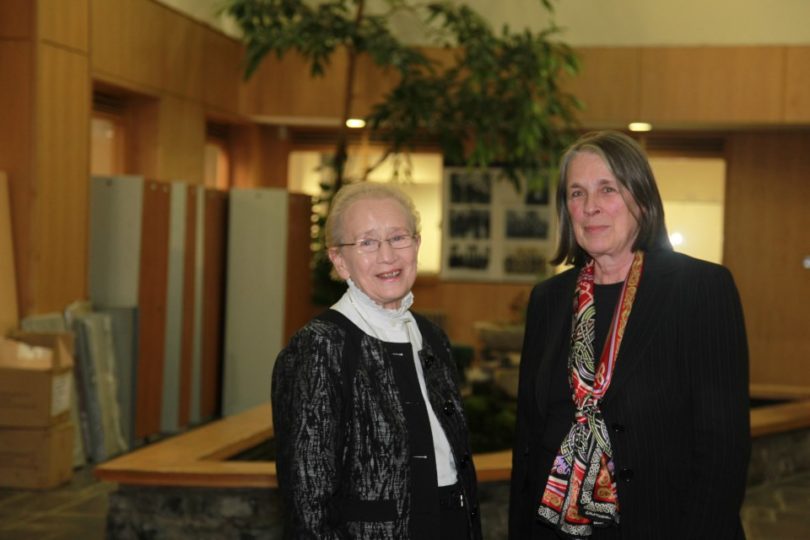
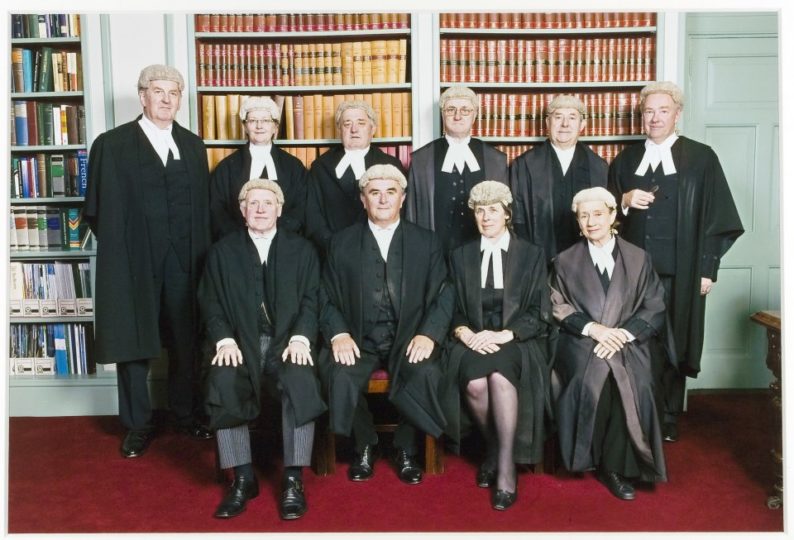
With the introduction of the act in 1919 barriers were removed and women began to make their presence felt. The first woman magistrate sat in Dublin in February 1920 and by January the following year the first woman juror sat on a case in Dublin. 1921 was also the year of the first call of women to the Bar in Ireland. Thus began the slow process of women making their mark on the Irish legal landscape that culminated in recent times with almost the entire Irish justice and law enforcement structure being headed up by women, Chief Justice, Minister for Justice, Attorney General, Chief State Solicitor and Garda Comissioner. It is no coincidence that the increasing presence of women within the legal profession from the 1970’s onwards coincided with increasing liberalisation of laws in favour of women, the removal of the marriage bar, the availability of family planning services, a fairer taxation of married women’s salaries, repealing of the 8th amendment and the availability of legal aid in civil and family matters, changes that can be said to have begun with the commencement of the Sex Disqualification (Removal) Act in 1919.
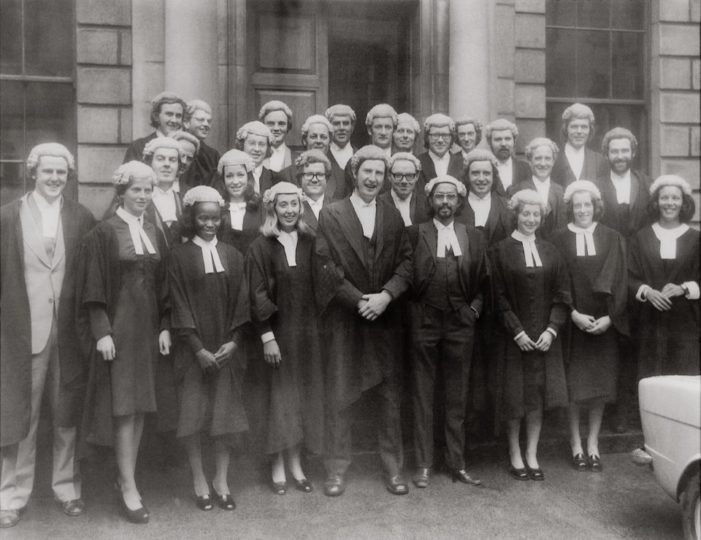
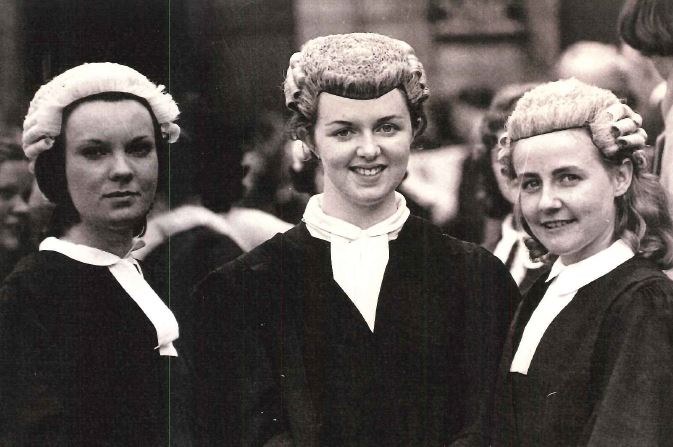
First 100 Women Called to the Bar
The following is a list of the first 100 women called to the Bar in Ireland. It has been through the hard work and dedication of these women trailblazers, breaking through the barriers of sex discrimination, that the way has been paved for the women of today to continue to advocate for the rights and place of women as active participants within Irish society.
1921
On the 1st November 1921 the first women were called to the Irish Bar. It was an historic occasion, not least because of the presence of Frances Kyle and Averil Deverell, but it was also the first call to the Irish Bar in the new Irish Free State. It was in 1921 that the Government of Ireland Act 1920 came in to force creating separate jurisdictions for Northern and Southern Ireland. The call of the first two women barristers made headlines at the time, not just in Irish newspapers, but also in the London Times and the New York Times.
On her first day of practice Averil Deverell arrived at The Law Library wearing the regulation wig and gown. It is interesting to note that in London the legal establishment were fretting over what the new women barristers should wear to court as an alternative to the horsehair wig referring to Frances Kyle and Averil Deverell as having “donned the horsehair with ludicrous effect. It is generally assumed that no such outrage will occur here”. The editor of the Irish Law Times jumped to their defence, however, and on the question of women and court dress stated:
“the question has not created any difficulty in Ireland where lady barristers wear the same style of wig and bands as men. The effect is certainly far from ludicrous. It is regarded as very becoming to the lady wearer.”
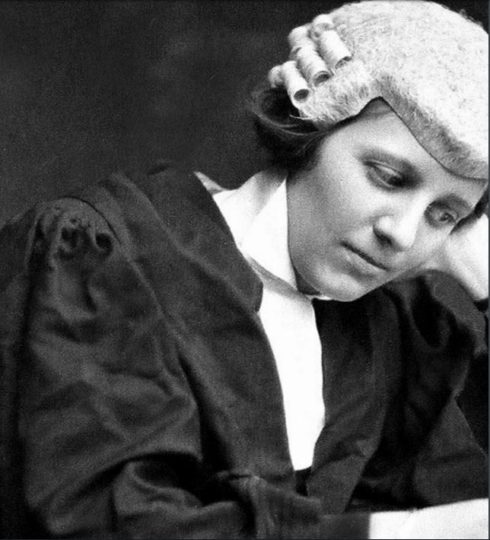
Frances Kyle
Frances Kyle was born in Belfast in 1894, the daughter of a prominent Belfast businessman. She was both the first woman to be awarded the John Brooke Scholarship, for coming first in the Bar examinations, and the first woman called to the Irish Bar. As there were now two jurisdictions on the island of Ireland she was called to the Bar of Northern Ireland in Belfast the following day.
Francis only practised in Dublin for a short time but was elected a member of the Northern Ireland circuit in 1922. She is reported in the Dublin Evening Telegraph in 1922 as having received eight briefs. She told a Daily Mail representative:
“I’m not at all certain that the first women barristers will succeed in making a living at the Bar. Legal friends advised me to devote myself to conveyancing, which does not require attendance at the courts, but I felt that the first woman barrister should practise, if possible, to prepare the way for those who will follow.”
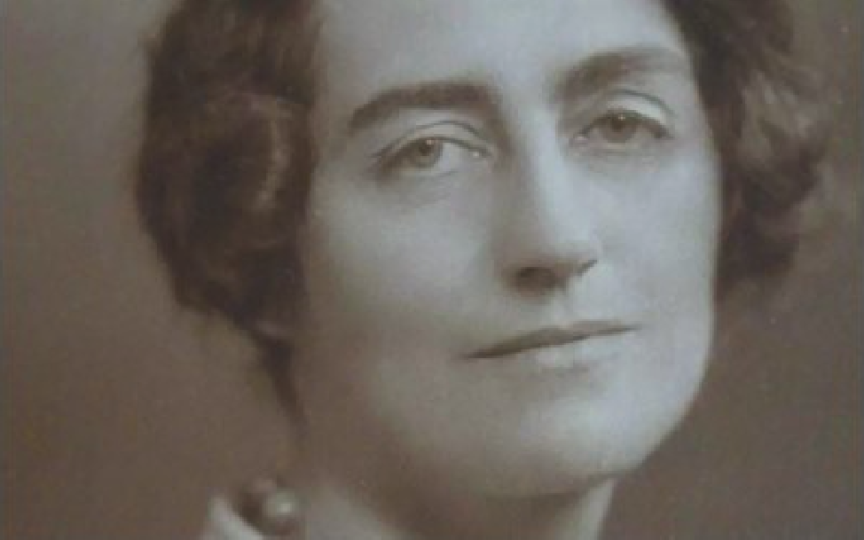
Averil Deverell
Averil Deverell was born in Greystones in 1893 to William Deverell, Clerk for the Crown and Peace in Wicklow, and Ada Kate Statter. Encouraged to learn to drive by her father in her early teens she went on to become an ambulance driver during World War One driving with the ambulance corps in France for the duration of the War. She went on to study law in Trinity College Dublin and later in the King’s Inns. She was the second woman called to the bar in 1921, alongside 18 men, one of whom was her twin brother, Captain William Deverell, and the first woman to practise at The Bar of Ireland.
At the Bar, Averil Deverell became a campaigner for gender equality and worked tirelessly to promote the view that women were equally competent to carry out the same work as men. She remained active in her career, practising for over 40 years, appearing in many cases and giving numerous written opinions on tangled legal subjects.
She is mentioned in the Irish Times in 1931 as having a reputation among her colleagues for witty repartee and later became known as ‘Mother of the Bar’, mentoring a number of women lawyers and continuing to advocate gender equality in the profession. Her call to the Bar in 1921 marked the progression of women into the Irish legal system and her portrait hangs in pride of place in The Law Library.
1923
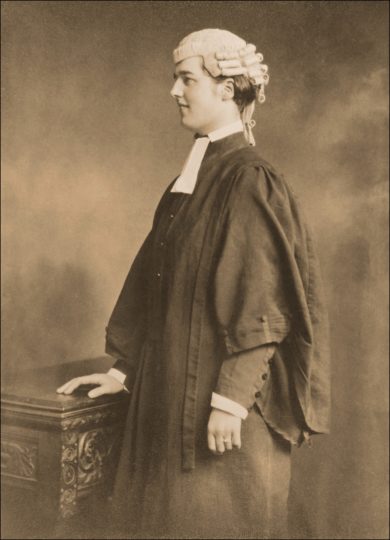
Mary “Mollie” Dillon-Leetch
Mary Dillon-Leetch became the third woman to be called to the Irish Bar. The daughter of a solicitor from Ballyhaunis in Co. Mayo, Mary practised on the western circuit, the first woman to do so, before she married Christopher Edward Callan in June 1926. Her daughter, Sylvia Callan, was later called to the Bar.
1924
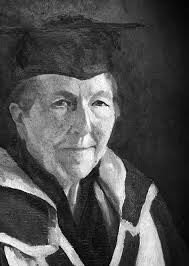
Frances Elizabeth Moran
Frances Elizabeth Moran was born in 1893 and called to the Bar on the 1st November 1924. Her appointment as Reid Professor in 1925 was the first appointment of a woman to a Dublin University Chair in any subject.
She became the first female law lecturer in Ireland, the first female Regius Professor at Trinity College Dublin and in 1941 she became the first woman to take silk, though she never practised at the Inner Bar. After the Second World War she attended the Nuremburg Trials in Germany and in 1947 toured Canada speaking of the experience. In 1968 she became Honorary Fellow and Honorary Bencher of the King’s Inns in Dublin. She also undertook a number of world tours for the International Federation of University Women, of which she became President. Her contribution to the education of women and their advancement in society was immense. She died on the 7th October 1977, aged 83, leaving a large bequest to TCD School of Law in her will. This bequest led to the establishment of the Frances E. Moran Memorial Studentship for postgraduate students.
1925
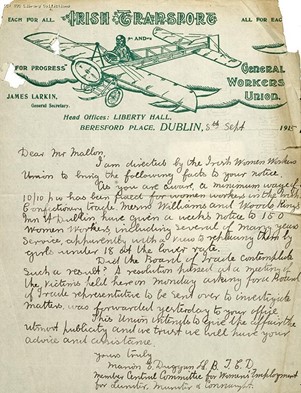
Marion Duggan
Marion Elizabeth Duggan was born in 1884 and had previous careers as a secretary, teacher and journalist before she was called to the Bar in 1925. Previous to her call she was a prominent suffragette and during her time at Trinity College Dublin she asked permission to form a suffrage society but was refused. She went on to become secretary of the Irish Women’s Reform League and established a courts watch group that attended court cases involving women to report on their treatment in a courtroom where judge, jury and lawyers were all men. She often advocated the need for women laywers and served as a court official in the Dáil Courts. After her call to the Bar she was formally appointed as a court reporter by the Law Reporting Council of Ireland in 1928 but was pressured to resign from this position in 1934. She died of heart failure in 1943.
Letter written by Marion Duggan to James Mallon, Secretary of the Central Committee for Women’s Employment and of the National Anti Sweating League to highlight the plight of women workers in the confectionary industry who lost their jobs after a minimun wage was introduced. 1915.
Antonia MacDonnell
Antonia Elizabeth MacDonnell was born on the 12th June 1899. She was called to the Bar on the 2nd November 1925. We are not aware if she practiced but she is listed in the law directory section of Thoms Directory for 1926, 1928 and 1929, the same year she married.
1926
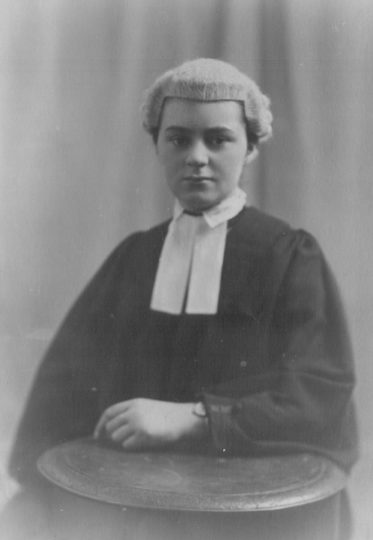
Gretta Flood
Gretta Una Flood was born on the 4th December 1904. She was called to the Bar aged 21 on the 18th January 1926 while employed in the Housing Department of Dublin Corporation. In 1929 she married the Assistant City Architect (later City Architect) Conor MacGinley and they had six children. She died on 11th May 1958 aged 53. The Law Library is grateful to the MacGinley family for supplying her portrait and biographical information.
1927
Kathleen Phelan
Kathleen Phelan was born on the 20th April 1890 in Waterford. She was called to the Bar on the 22nd June 1927. She practised in Dublin and on the Southern Circuit. Originally a maths lecturer, she was mentioned in the Irish Times of the 26th March 1930 as being apart of a delegation representing the Irish Free State at the International Conference on the Codification of International Law at The Hague. Other countries, including Great Britain, had sent women as ‘technical advisers’ but the fledgling Irish Free State chose to send Kathleen as a full delegate. She went on to work in the civil service. She died in 1956 aged 66.
Mary Ita Malone
Mary Ita Malone was born on the 10th December 1900 in Trim, Co Meath, the only daughter of auctioneer and valuer Laurence P. Malone. She was called to the Bar on the 1st November 1927 and is listed in the Thom’s Directory of 1945 within the law directory section.
1929
Violet Kimpton
Violet Kimpton was born on the 10th November 1903 in Cork. She was called to the Bar on the 5th June 1929 and went on to practise for a time. She lived in Dublin and practised for a few years, she is listed in the Thom’s Directory of 1937 as a barrister-at-law. She went on to marry William Bloomer and had four children. She died in 1988 at the age of 85.
1930
Kathleen Butler Garret
Kathleen Butler Garrett was born in Oklahoma in 1906 to Cherokee parents. She moved to Ireland with her family in 1922 and lived at Glencairn House in Stillorgan. She was called to the Bar on the 25th June 1930, the first American woman admitted to the Irish Bar. She later went on to author children’s books.
Anne Caulfield
Anne Caulfield was born on the 4th November 1905 in Cork. Her father John P. Caulfield was a sorting clerk and telegraphist and her mother Jane Caulfield (nee Cudmore) was a shop keeper. She was called to the Bar on the 3rd November 1930.
1933
Catherine Martin
Catherine Mary Martin was born on the 24th November 1908. She was called to the Bar on the 1st November 1933.
1934
Muriel Lysaght-MacGowan
Muriel Lysaght-MacGowan was born on the 13th January 1912. She was called to the Bar on the 27th June 1934. She may have practiced for a few years as she was listed as a barrister-at-law in a number of Thoms Directories up to 1946.
1935
Mary Wells
Mary Wells, born in Monaghan in 1912 the daughter of a solicitor from Carrickmacross, was called to the Bar on the 18th January 1935. She went on to marry George Paul Kerr in 1939. She died in 2010 at the age of 99, remembered by her children, grandchildren and great-grand children, and donated her body to medical science.
1937
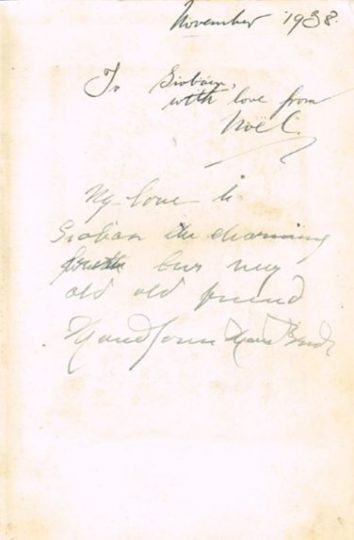
Siobhan Ite Nic Churtain
Siobhan Ite Nic Churtain was born in Cork the daughter of Tomas Mac Churtain, Lord Mayor of Cork City and an officer in the IRA. Tomas was shot dead in his home by members of the RIC in 1920, of which young Siobhan and her family were witnesses. She was called to the Bar on the 1st November 1937. She made her first appearance at Cork Circuit Court on the 25th January 1938 where, as the Irish Law Times states: “she was warmly welcomed by Judge T. O’Donnell, who wished her a long and prosperous career at the Bar.” She was appearing for the applicant in a case related to Workmen’s Compensation and was granted an application for payment of monies out of court.
A friend of Maud Gonne MacBride she was gifted a copy of her memoir with the inscription “My love to Siobhan the charming barrister”. She also had a school for harpists in Cork and was gifted a harp by Maud Gonne who had previously used the instrument to accompany W.B. Yeats reciting his poetry. She died in 1994 at the age of 85.
Inscription on the memoir of Maud Gonne which she gifted to Siobhan MacCurtain which reads “My love to Siobhan the charming barrister but my old old friend, Maud Gonne MacBride.” 1938
1938
Anne Dockrell
Anne Dorothy Dockrell was born in Dublin in 1890, the only daughter of Sir Maurice Dockrell. She was called to the Bar on the 2nd May 1938.
1940
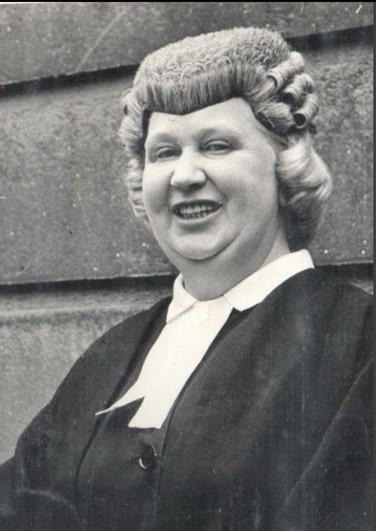
Agnes Cassidy
Agnes Cassidy was born in 1918, the daughter of barrister John Price Cassidy, and was called to the Bar on the 18th January 1940. She went on to have a successful career, becoming Reid Professor of Law at Trinity College Dublin in 1950 and the Republic of Ireland editor of the Irish Jurist Reports. In February 1975 she became the second woman sworn in as a judge of the District Court and in the same year was appointed to the Adoption Board, of which she became Chairman in 1983. She died in 2001 at the age of 83.
1941
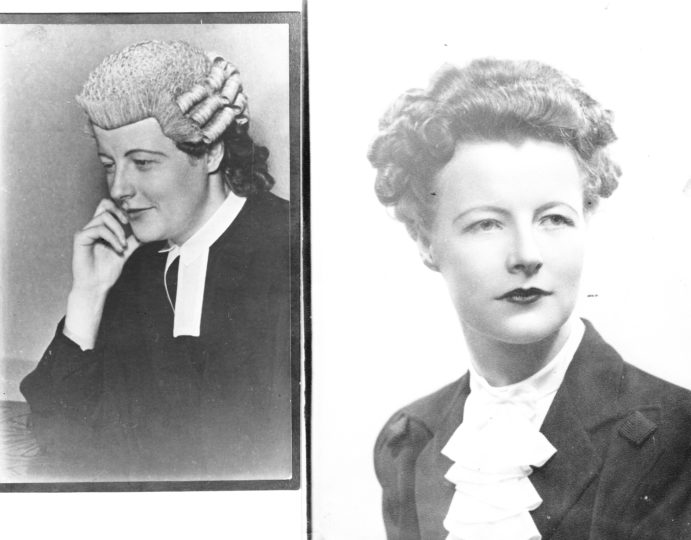
Eileen de Riva O’Phelan
Eileen de Riva O’Phelan was born in Waterford on the 31st May 1918. She was called to the Bar on the 3rd November 1941. In 1952 she travelled with her sister Elva, an actress, to Australia intending to live there. She died in Melbourne, Australia, in 2005.
Olive Overend
Olive Overend was born in Dublin in 1909. She was the daughter of Andrew Kingsbury Overend, Judge of the High Court from 1943-47. She was called to the Bar on the 20th January 1941. She died in December 1976 in Yorkshire, England aged 67.
1942
Margaret Bermingham O’Toole
Margaret Bermingham O’Toole was born in Shanghai in 1917. Her father was stationed there as Assistant Commissioner of Police. She was educated at University College Dublin where, along with her brother James, she was an active member of the Literary and Historical Society. She also obtained exhibitions from various universities in Ireland, England and France, where she was conferred with Docteur en Droit Paris. The 21st woman called to the Bar in Ireland in 1942 she was affectionately known by her colleagues in The Law Library as ‘Shanghai Lil’. She was known for her considerable powers of oratory, her cadences and beauty of diction delivered with a fine speaking voice earned her a reputation as ‘Rumpole of the Four Courts’ in later years. One of her career highlights was appearing as junior counsel in the Vozza case of 1957, heard in the Supreme Court, which went on to become a leading authority where an applicant has suffered a public wrong. She was known throughout her career as a person of integrity, good humour and someone who fought tirelessly for Justice. She died in 1982 at the age of 65.
1943
Grace Costelloe
Grace Mary Costelloe was born in Dublin on the 22nd November 1921, the eldest daughter of former Taoiseach John A. Costelloe. She was called to the Bar on the 1st November 1943. She went on to marry Alexis James Fitzgerald in 1946. She died on the 1st January 1972 at the age of 50.
Eileen Moran
Eileen Mary Moran was born in Dublin on the 10th June 1922 the daughter of John Moran, a civil servant. She was awarded the Society’s Exhibition prize and was called to the Bar on the 1st November 1943. She went on to marry Pierce O’Byrne and she died on the 20th January 2016 at the age of 94.
1944
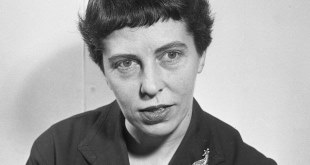
Máire Mhac an tSaoi
Máire Mhac an tSaoi was born in 1922, the daughter of Irish revolutionary Sean McEntee one of the founding figures of Fianna Fáil. She was called to the Bar on the 22nd June 1944. After being called to the Bar she worked in the Department of External Affairs (now Foreign affairs). She is regarded as one of the leading Irish language poets of the twentieth century whose works helped to pave the way for other Irish women poets. She married Conor Cruise O’Brien, an Irish politician, writer, and historian, and joined him in many political causes.
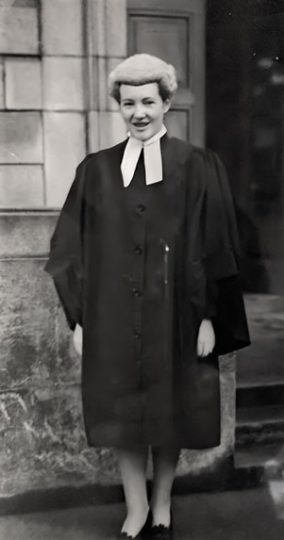
Una McAuliffe Linehan
Una McAuliffe Linehan was born on the 4th August 1923 in Kuala Lumpar, Malaya, where her father, William Linehan was in the colonial Malay Civil Service. She returned to Ireland to attend boarding school at Laurel Hill in Limerick. At the outbreak of the Second World War her mother also returned to Ireland before the Japanese invasion. Her father, however, was held in a Japanese POW camp during the war and would have still been imprisoned when she was called to the Bar here in Ireland. According to family tradition Una returned to Malaya after the war and worked for a time on case preparation for war crimes.
Finding it hard to break in to the ‘old boys network’ of the legal profession Una went on to have a career in Radio Eireann. She started out as a news reader before it was declared a male preserve. She presented a childrens magazine programme called ‘Coisir Samhradh’ in the early days of television and went on to train the next few generations of tv presenters and producers within RTE. She died in April 1990.
1945
Bridget Walsh
Bridget Walsh was born on the 30th December 1904, one of seven children of farmer Thomas Walsh in Grange, Co. Waterford. She worked as assistant librarian in the King’s Inns from 1938-1944 during which time she began her legal studies there. In June 1944 she took over as librarian in the King’s Inns and she was called to the Bar on the 1st November 1945. She continued as librarian until December 1969. She died on the 20th November 2000.
1946
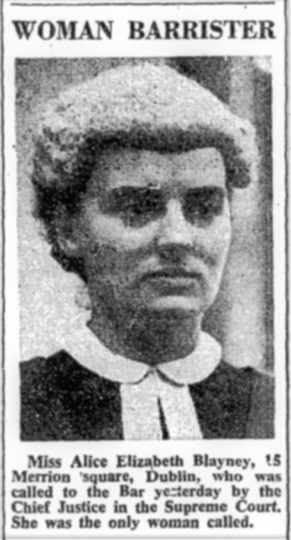
Alice Blayney
Alice Blayney was born on the 13th February 1924. She was called to the Bar on the 24th June 1946 and two years later in 1948, her brother, John Blayney was called to the Bar. She subsequently married T. A. Finlay, judge, politician, barrister and Chief Justice. Her daughter, former Supreme Court judge Mary Finlay Geoghegan said of Alice that she reared her daughter with the same expectations as her brothers,
“My mother is a less well-known person but it is perhaps significant that she was called to the Bar, second in a distinguished call, in 1946. She never practised. In accordance with the custom of the time she ceased work on her marriage in 1948 and she devoted her incredible abilities to her family, and we all, of course, benefited so much.”
1948
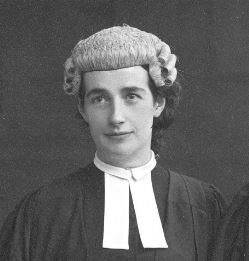
Nora Durkan
Nora Durkan was born on the 2nd February 1921. She was awarded the 2nd Victoria Prize and was called to the Bar on the 2nd July 1948. She married barrister Paddy Waldron in 1961 and had three children. She died in 1978 at the age of 57.
1949
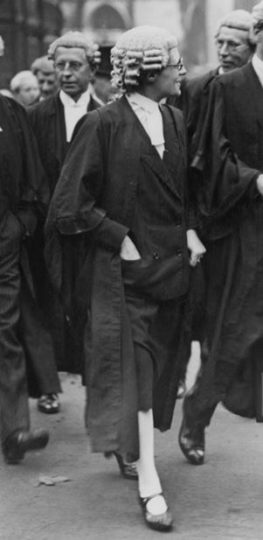
Venetia Stephenson
Venetia Stephenson was called to the Irish Bar in 1949. Previously she had been called to the English Bar in 1924 and was notable as the first woman barrister to appear as leading counsel for the defence in a murder trial in 1929. A news story in the Daily Herald in 1929 remarked:
Miss Stephenson wears horn-rimmed glasses and is petite and business-like. A lucid speaker, she has several times been complimented by judges on her ability in conducting cases.”
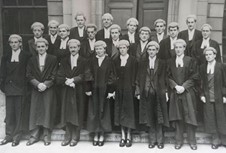
Mary Donnellan
Mary Josephine Brita Donnellan was called to the Bar on the 1st November 1949
Mary Neylon
Mary Josephine Neylon was born in Cork on the 9th March 1916. She was called to the Bar on the 1st November 1949. She later became the librarian of the King’s Inns Library, a post she held from 1970-1984, taking over the role from Bridget Walsh, another of our first 100 women. During her time as librarian she authored an article on the King’s Inns Library in The Law Librarian journal. She died on the 19th May 1995.
Call to the Bar 1st November 1949 including Mary Neylon and Mary Donnellan
1950
Ethel Beatty
Ethel Ursula Beatty was born in Dublin on the 18th September 1926 the only daughter of solicitor John Joseph Beatty. She was called to the Bar on the 1st December 1950 and was a recipient of the John Brooke Scholarship. She may have practised for a few years as she listed her occupation on ship passenger lists to Liverpool in 1953 and 1956 as Barrister-at-Law. In July 1960 she married Eldon Young Exshaw and went on to have two children.
1951
Alys Osterberg Goodbody
Alys Mary Osterberg Goodbody born on the 21st March 1925. She received a Bachelor of Arts from Trinity College Dublin and was called to the Bar on the 5th November 1951.
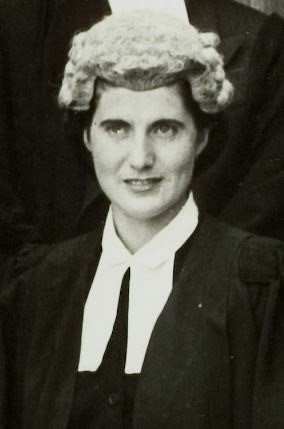
Ita Heslin
Ita Brigid Heslin was born on the 23rd May 1925. She was awarded 3rd Victoria Prize and was called to the Bar on the 6th July 1951.
Ita spent most of her working life in the High Court, where she had a distinguished career. She progressed through periods in various offices as a junior clerk, then as Senior Clerk in the Taxing Masters’ Office and, after a
newly formed Adoption Board, returned to the courts where
she served successively as Assistant Examiner, Registrar of Wards of Court, and finally as Registrar of the Supreme Court.
At all stages in her career, Ita took a very active role in matters affecting the staff, and very often formed part of delegations which had discussions with Department of Justice officials and on occasions Ministers themselves. These discussions ranged over salary scales, appropriate grading for the various positions in the High Court and Supreme Court offices and methods of promotion. Eventually, at her retirement, most of these matters had been settled, generally operating to the satisfaction of both sides. The results of her hard work and that of her colleagues on the committees and delegations remained in place and were an appropriate basis from which the present Court Service structure (in relation to the High Court and Supreme Court) was launched.
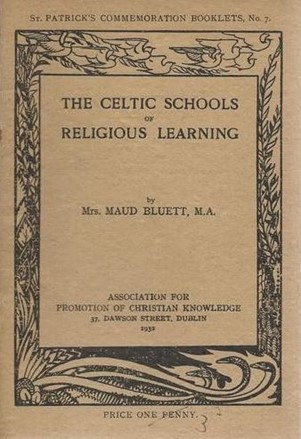
Maud Cherry Bluett
Maud Cherry Bluett was born in Dublin on the 6th June 1895. She was the only daughter of the Rt Hon R.R. Cherry politician, Attorney General for Ireland and Lord Chief Justice from 1913-1916, about whom she authored a book in 1924 entitled’A Short Memoir of the Rt Hon Richard Robert Cherry, sometime Lord Chief Justice of Ireland’.
Maud was called to the Bar on the 5th November 1951. She was a Blake Scholar in TCD and lecturer in history. In 1956 at her own request she was permitted to be disbarred and became a solicitor. She died in January 1963.
Cover page of ‘The Celtic Schools of Religious Learning” by Maud Cherry Bluett
1953
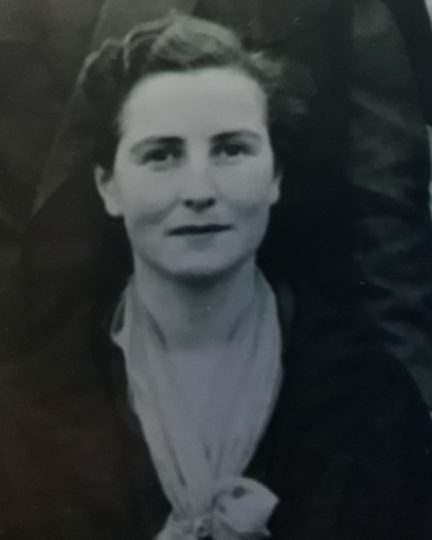
Leonie Mary Lehane
Leonie Mary Lehane was born in Dublin on the 23rd November 1931 and she was called to the Bar on the 30th June 1953. She went on to marry future “Father of the Bar” Maurice Gaffney, who was called to the bar in February 1954 and had two children.
Maurice commentated in later years that he always felt his clients got two barristers for the price of one as Leonie was not only his secretary but also a fantastic sounding board and mentor.
Rose Constance Sheehan
Rose Constance Sheehan was born on 24th February 1904 the eldest daughter of Jeremiah Sheehan, a police sergeant in the Dublin Metropolitan Police. She was called to the Bar on the 2nd November 1953.
1954
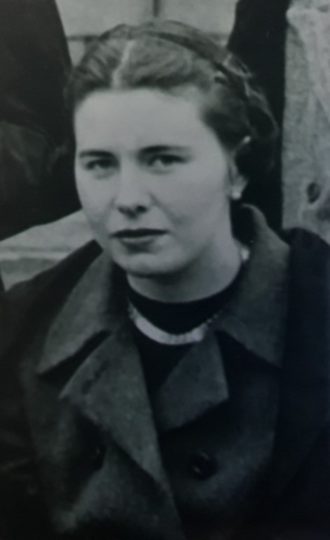
Joan Knipe
Joan Clare Knipe was born in Dublin on the 25th August 1931. She was called to the Bar on the 1st November 1954.
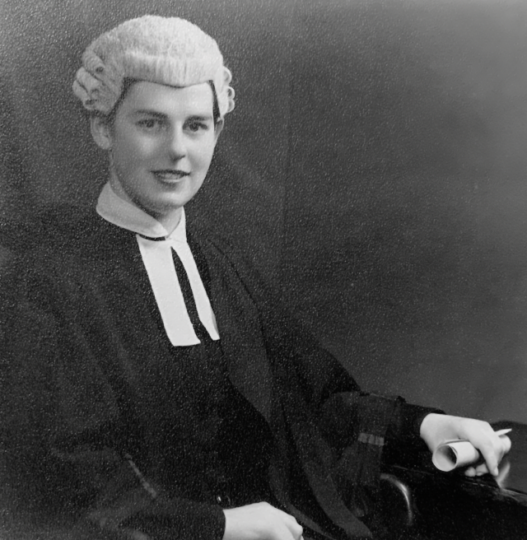
Sylvia O’Connor (nee Callan)
Sylvia O’Connor (Nee Callan) was born in Roscommon on the 12th November 1932. She was the daughter of Mary ‘Mollie’ Dillon-Leetch BL, the third woman called to the Bar in 1923. Sylvia was called to the Bar on the 1st November 1954. Subsequently she was admitted to practice as a Solicitor in 1976 and continued to practice as a Solicitor in Wexford until her retirement.
Miriam Hederman
Miriam Hederman was born in Naas, County Kildare on the 6th June 1932. She studied modern languages at University College Dublin and holds a doctorate in political science from Trinity College Dublin. She was called to the Bar on the 1st November 1954. She became the first woman university chancellor with her appointment as chancellor of the University of Limerick.
Dr Hederman O’Brien was also chairwoman of the Foundation for Fiscal Studies and the Irish Committee of the European Cultural Movement. She was a member of the board of directors of AIB, the Irish Centre for European Law, the National Economic and Social Council, the Council of the Statistical and Social Inquiry Society of Ireland, the Advertising Standards Authority of Ireland and a trustee of the Irish Centre for International Affairs in Brussels.
She was chairwoman of the Irish Council of the European Movement (1977-80) and chairwoman of the Commission on Taxation (1980-85).
In 1984 she received the European Order of Merit for her contribution towards European understanding and integration. (Irish Times 05/02/1998)
1955
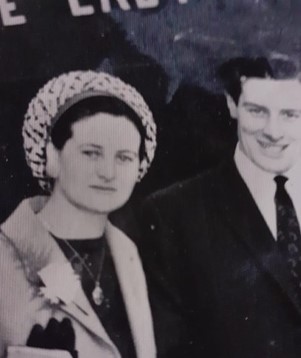
Ann (Mary) Callery
Ann Callery was born on the 9th March 1930 in Roscommon. She was called to the Bar on the 2nd November 1955. She currently lives in Kimmage Dublin. Below is her testimony of how she came to be called to the Bar and her life after that calling in 1955.
I wasn’t sure what I wanted to do when I left school. My Father was a Solicitor. My Mother wanted me to do medicine, so I came to Dublin and went to my first lecture. I hated it! I decided to change to law then. I was delighted to be well away from Medicine!
I stayed in Dominican Hall and loved being in Dublin. During my studies I had to take a year off to mind my Mother. I then returned to Law again. I was called to the Bar in 1955. As I couldn’t get a job in Dublin, I went to London and worked for a year. I returned to Dublin and worked in the Law library and devilled with Eamonn Walsh for a year. I returned to London and worked there for some time and then became a teacher of English in Switzerland.
After that I again returned to Dublin and in 1966 I got a job with the Revenue Department working in Dublin Castle. I worked there for 22 years. I accepted an offer of early retirement and now enjoy travel, painting, gardening, nature, being involved in my local church and community activities here in Dublin.”
1956
Florence Donoghue
Florence Donoghue was born in Kerry on the 12th February 1928. She was called to the Bar on the 11th January 1956.
Mary Bolger
Mary Aingelda Catherine Bolger was called to the Bar on the 6th February 1956.
Ann Flynn
Ann Mary Gabriel Philomena Flynn was called to the Bar on the 6th November 1956.
Irene Keaney
Irene Mary Cecilia Keaney was called to the Bar on the 6th November 1956.
1957
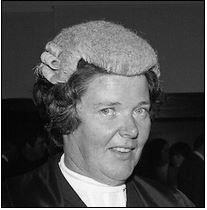
Mella Carroll
Mella Carroll was born in Dublin in 1934 the youngest daughter of Patrick Carroll, a Garda chief superintendent, and Agnes Mary Caulfield. She first studied French and German in UCD, then went on to study law at the King’s Inns where she was called to the Bar in 1957. In 1976 she was called to the Bar in Northern Ireland and in 1977 became the first practising female senior counsel and for a period was the only female SC practising in the Irish state. A popular and well-respected barrister, Mella was unanimously elected chairwoman of the Bar Council in 1979 and a year later she became the first woman appointed to the High Court, representing a milestone in Irish legal history. She was one of the longest serving High Court judges, having sat on the bench for 24 years.
As well as serving on the High Court, she chaired the Commission on Nursing and the second Commission on the Status of Women. In addition, she served on the administrative tribunal of the International Labour Organisation in Geneva until 2002, becoming its vice president and also president of the International Association of Women Judges.
She died in January 2006, shortly after her retirement from the High Court. When she died, she was serving as chancellor of Dublin City University and as chairwoman of the UCD Irish Centre for Commercial Law Studies. She was an inspiration to many, especially women, who wished to pursue a legal career.
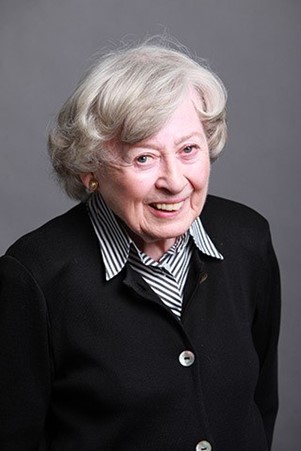
Therese Anne (Keara) Donnelly
Therese Anne (Keara) Donnelly was called to the Bar 11th November 1957 and is still a practising member.
Crosadelle Cruess Callaghan
Crosadella Cruess Callaghan was called to the Bar on the 22nd July 1957.
Iris McGonagle
Iris Mary McGonagle was called to the Bar on the 11th November 1957.
1958
Geraldine Skinner
Geraldine Mary Skinner was called to the Bar on the 11th November 1958.
1959
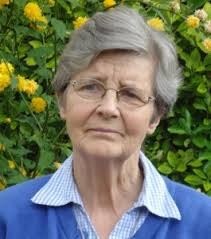
Aideen Kinlen
Aideen Kinlen was called to the Bar on the 16th November 1958. After practising at the Bar for a couple of years she joined the Society of the Sacred Heart, RCSJ as a nun and also became a teacher. At one stage she was a teacher at Mount Anville school. One of her many pupils was Senior Counsel, Nuala Butler, who found Aideen to be an excellent teacher of whom she has many fond memories. Her brother is Dermot Kinlan who practiced at the Bar and later became a High Court Judge.
Stella O’Conor
Stella O’Connor, the daughter of Denis Hayes O’Conor who was also a barrister, was called to the Bar on the 16th November 1959. Though called she never practiced at the Bar.
1960
Anne Kathleen Butler
Anne Kathleen Butler was born on the 31st December 1931 in Swords, Co. Dublin. She was called to the Bar on the 21st July 1960.
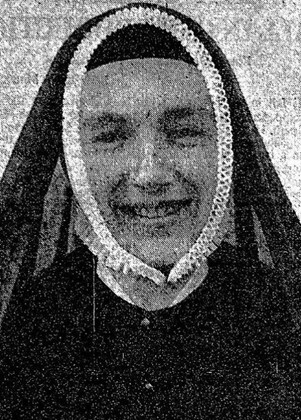
Ruth Mary Sheehy
Ruth Mary Sheehy was born in Dublin in 1926. She studied at University College Dublin and went on to study at the King’s Inns. As a student she was an academic high achiever as a medal-winning legal advocate but decided to become a nun with the Sacred Heart Order before being called to the Bar. Family lore tells of how Ruth’s cousin Owen Sheehy-Skeffington had told her if she ever changed her mind he would be the first with the ladder at the convent walls.
By the late 1950’s Ruth volunteered to go to the far east with the missions where she was to be posted at the Jesuit run Sophia University in Tokyo, Japan. Believing that her legal qualifications would be useful to her teaching role the order encouraged her to complete the Inns and she was called to the Bar in 1960, in absentia as she was on a flight to Tokyo at the time of the call. As the first nun to be called to the Irish Bar her call was noted in newspapers from as far away as London, Boston and Pennsylvania.
1963
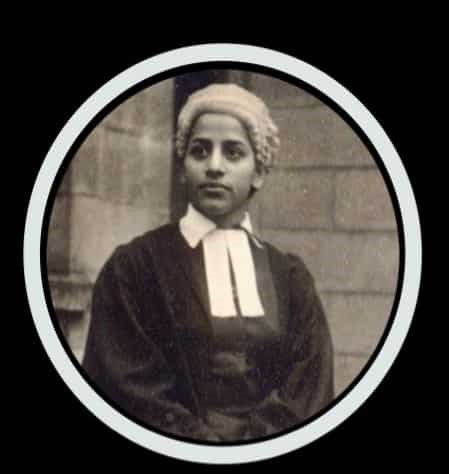
Mrs. Abdullah nee Soad Mohammad Nasser Lamki Riyami
Mrs Abdullah Riyami was born on the 26th November 1938 and was called to the Bar on the 29th October 1963.
Dr Suad bint Mohammed al Lamkiya was the first law graduate of Oman, the world’s second Arab female judge.
She was considered the first legal adviser in the Sultanate and the first lawyer as well, and the first female public prosecutor, who studied law outside the Sultanate, in Ireland, in 1959, at Trinity College Dublin.
1965
Martina O’Gorman
Martina Louie O’Gorman was born in Dublin on the 30th January 1937. Her father was a pharmacist. She was called to the Bar on the 12th September 1965 and went on to practise as a solicitor. She died on the 15th March 2009.
Nodlaigh Mary Patricia McCarthy
Nodlaigh Mary Patircia McCarthy was born on the 9th December 1939. Her father was a doctor in St. Kevin’s Hospital, James’s Street. She was called to the Bar on the 12th November 1965 and practised in London.
1966
Maelissa Watson
Maelissa Rose Philomena Watson was born in Roscommon on the 19th June 1943. She was called to the Bar on the 30th July 1966.
Esther Anne Hogan
Esther Anne Hogan was born on the 17th April 1945 in Limerick. She was called to the Bar on the 9th April 1966.
Jane Frances Kelly
Jane Frances Kelly was born in Kilkenny on the 13th January 1945. Her father was a solicitor. She was called to the Bar on the 9th November 1966.
Constance Kilduff
Constance Margaret Kilduff was born in Dublin on the 7th July 1944. She was called to the Bar on the 9th November 1944.
Josephine Johnson
Josephine Mary Philomena Johnson was born in County Mayo on the 5th September 1942 and was called to the Bar on the 20th July 1966.
1967

Mary Robinson was born in Ballina, County Mayo, in 1944. She studied law at Trinity College Dublin. In 1967 she was called to the Bar and became the youngest professor of law at Trinity. In 1968 she attained a master’s degree in law from Harvard University and in 1969 she was elected as an Independent Senator to Seanad Éireann. Remarkably she became Senior Counsel whilst still in her twenties. As a politician and barrister, she campaigned for a wide range of issues including the right of women to sit on juries, the removal of the marriage bar from the civil service and the right to access contraception.
In 1990 she agreed to become the first Labour nominee for the Presidency of Ireland, running a successful campaign that saw her become the first female President of Ireland. Upon her election she famously stated: ‘I was elected by the women of Ireland, who instead of rocking the cradle, rocked the system.’
She was a popular President, breathing new life and energy into the position. In September 1997, she resigned from the presidency and took up a new position as United Nations High Commissioner for Human Rights, a position she held until 2002. In 2007 Nelson Mandela announced the formation of The Elders, a group comprising public figures, leaders and activists, to contribute their wisdom towards tackling world problems. Mary Robinson has been an active participant in the group and following the death of Kofi Annan, was appointed chair in November 2018.
Caroline Kenny
Caroline Elizabeth Kenny was born on the 22nd September 1945 in Dublin. She was called to the Bar on the 26th July 1967.
Flavia Wade (nee Davis)
Flavia Margaret Wade was born on the 26th November 1928. She was called to the Bar on the 26th July 1967.
Muireann McHugh
Muireann Catriona McHugh aft O’Briain was born in Dublin on the 12th March 1944. She was called to the Bar on the 7th November 1967 and was made a Senior Counsel on the 25th February 1994.
She spent 28 years in practice at the Irish Bar including 13 years as the Legal Advisor to the Labour Court.
In 1998. Muireann took up a full-time position as Executive Director of ECPAT International. Upon her return to Ireland in 2002, Muireann was appointed as the Director of the Dublin Rape Crisis Centre.
Since 2004 she has worked as the Legal Manager of St. James’s Hospital, the largest teaching hospital in Ireland.
Throughout her career, Muireann has provided consultancy and advisory work on human rights and children’s rights to several NGOs, and has contributed to numerous publications and teaching materials. Muireann was also a member of the European Commission Expert Group on Trafficking in Human Beings from 2008-2011.
Antoinette Tormey
Antoinette Catherine Tormey was born on the 3rd January 1946 in Dublin and was called to the Bar on the 7th November 1967.
Clodagh Hickey
Clodagh Margaret Hickey was born on the 14th December 1947 in Wexford. She was called to the Bar on the 14th December 1967.
1968
Margaret Lysaght
Margaret Ann Lysaght was born in Galway on the 28th April 1946. She was called to the Bar on the 29th July 1968. She had a long and distinguished career at the Bar and married fellow barrister, George Brady.
Helen Moore
Helen Therese Moore was born on the 10th March 1945 in Dublin. She was called to the Bar on the 12th November 1968.
Jennie Gilbert
Jennie Zelda Gilbert was born in Dublin on the 11th January 1909. She was called to the Bar on the 20th December 1968.
1969
Mary Catherine O’Flynn
Called to the Bar on the 28th July 1969
Una Rose O’Reilly
Called to the Bar on the 28th July 1969
Carol Ann O’Kennedy
Called to the Bar on the 13th May 1969. She practised at the Bar for many years and became a Senior Counsel.
1970
Catherine Magourty
Called to the Bar on the 13th May 1970.
Jacqueline Cotter
Called to the Bar on the 21st July 1970.
Carmel O’Sullivan
Called to the Bar on the 21st July 1970
Catherine Moore
Called to the Bar on the 21st July 1970.
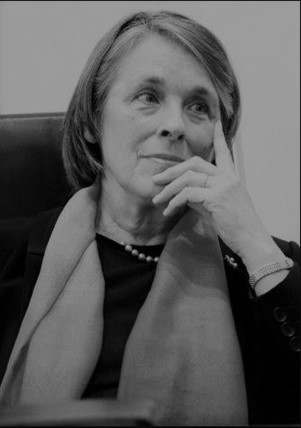
Susan Denham (nee Gageby)
Susan Gageby was born in Dublin in 1945. She was the eldest child to Dorothy Mary Lester and Douglas Gageby, the former editor of The Irish Times. She studied at Trinity College Dublin, the King’s Inns and the Law School of Columbia University, New York. She was called to the bar in 1971 and became a Senior Counsel in 1987. As a barrister, she was involved in a number of high profile cases particularly in the area of judicial review. She became a High Court judge in 1991 and in 1992 was the first woman appointed to the Supreme Court. On her first day in the Supreme Court conference room in 1992 she said:
I felt . . . that I was on the shoulders of the pioneering women of previous generations.”
She is credited with many needed administrative reforms in the court system and with facilitating a more collegiate and mutually supportive culture in the judiciary. From 1995 to 1998, she chaired the Working Group on a Courts Commission. This led to the establishment of the Courts Service. She served on the Board of the Court Service from its inception, and chaired it from 2001–04. From 2006, she chaired the Working Group which recommended the establishment of a Court of Appeal. This was ultimately established in 2014.
Denham was part of the Irish delegation which, with the Netherlands and Belgium, established the European Network of Councils for the Judiciary (ENCJ). From 1st January 2015 to 31st December 2016, she was President of the Network of the Presidents of the Supreme Judicial Courts of the European Union which is an association of Supreme Court Presidents and Chief Justices of EU Member States. On 25 July 2011, she was appointed by the president as Chief Justice on the nomination of the government. She retired from the position in July 2017.
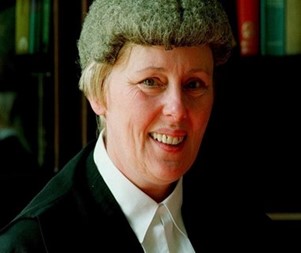
Mary Laffoy
Mary Laffoy was born on the 17th June 1945. She was educated at University College Dublin and later the King’s Inns. She was called to the Bar on the 27th July 1971 and took Silk in 1987. She was appointed as a High Court judge in 1995 and remained in that position until 2013 when she was appointed as a judge to the Supreme Court. She retired from that position in 2017.
She is most well known for presiding over the Commission to Inquire into Child Abuse 1999-2003, a position she resigned from in 2003.
She served as Chair of the Citizens’ Assembly in 2016-2018 and is currently president of the Law Reform Commission.
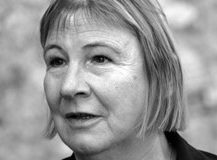
Yvonne Murphy
Yvonne Murphy was born in County Donegal. In 1967 she began working as an executive officer for the Revenue Commissioners in Dublin, studying law at University College Dublin part-time. It was there that she met her husband-to-be, Adrian Hardiman. Both went on to study at the King’s Inns in Dublin. Murphy was called to the Bar in 1971, three years before her husband. She postponed her entry into life as a practising barrister and went to work as an air hostess with Aer Lingus. In 1973 she completed a postgraduate diploma in social science at UCD and became an information officer – and subsequently head of information – at the National Social Service Board where she was responsible for setting up a network of citizens’ information centres throughout the country.
In 1979 she joined RTÉ where she worked in the newsroom until 1982 when she was appointed special adviser to former Labour Party Tánaiste Michael O’Leary. She then spent two years as editor of the Industrial Relations News before eventually entering The Law Library in 1984. She initially specialised in employment law and was vice-chairwoman of the Employment Appeals Tribunal and the Employment Equality Agency. In 1998 she was appointed a Circuit Court judge and in 2003 she was appointed to the Special Criminal Court.
In 2006, she was appointed chair of the Commission of Investigation into Sexual Abuse by Catholic clergy in the Archdiocese of Dublin. That Commission culminated in the production of the Murphy Report in 2009. She then also chaired an inquiry into sexual abuse in the Roman Catholic Diocese of Cloyne, which led to the Cloyne Report in July 2011. In 2015, she was appointed chair of the Mother and Baby Homes Commission of Investigation.
Patricia Morrissey
Called to the Bar on the 27th July 1971.
Jacinta Moore
Called to the Bar on the 18th November 1971.
1972
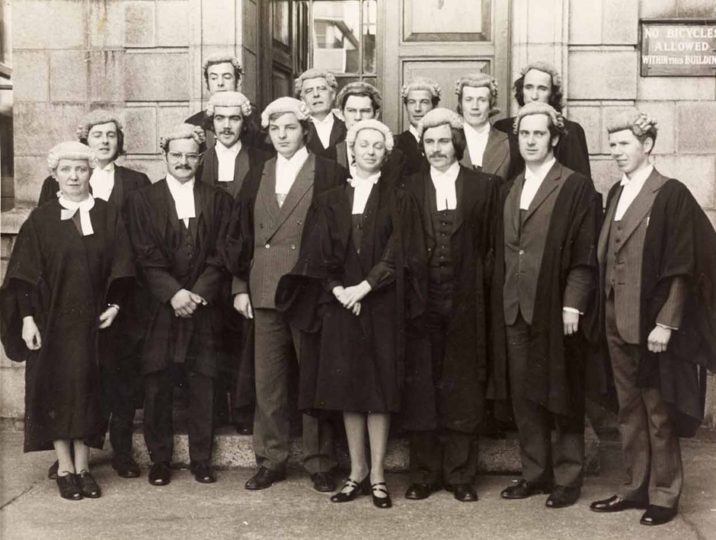
Barbara Keating
Barbara Keating, the daughter of Irish parents, grew up in Kenya, where her father was a surgeon with the Colonial Medical Service and her mother was a teacher. Upon her return to Ireland, Barbara studied law at University College Dublin. In 1972 she was called to the Bar and met Rory O’Hanlon SC, future judge of the High Court. They were married in 1974. At the time of their marriage she was 26 years old and Rory was 50. He was a widower with seven children. His first wife Mary Ingoldsby had died in 1971 when their youngest child was just two years old. Barbara and Rory subsequently had five children of their own and Barbara gave up work to mind the children.
giving up my practice was a big deal, but I never regretted doing that. I could see that it was impossible to do both”
As the children got older, Barbara returned to work. She taught speech and drama and wrote two musicals. In later life she became a successful novelist, along with her sister Stephanie Keating.
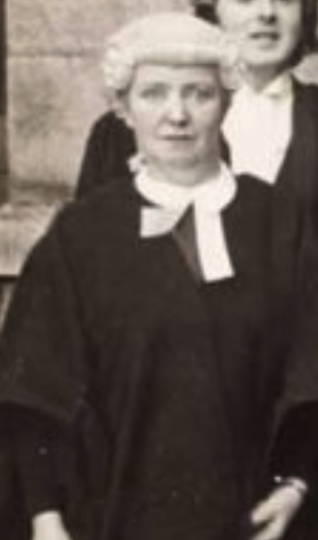
Brigid Mary Cotter
Brigid Cotter was born in Roscommon in 1921, the eldest of 12 children. Her father, Nicholas Cotter, was the chief agricultural officer for Roscommon. Brigid attended University College Dublin where she graduated with a bachelor in science in both chemistry and mathematics in 1944 and a masters degree the following year. In 1947 she moved to Manchester where she worked at the Imperial Chemical Industries laboratories. She returned to Ireland in 1948 and went on to spend the next ten years as a chemist in the state laboratory in Dublin. In 1958 she became an agricultural inspector and chief technical officer with the Department of Agriculture and held this post until her death in 1978. During her time with the Department of Agriculture she gained a law degree in 1963, and a masters in 1969, both from the University of London. She was later called to both the English and Irish Bar – the latter in 1972. She worked on various law committees and traveled worldwide with the International Bar Council.
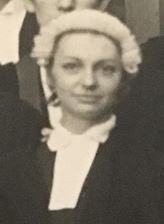
Jane Flood Liddy
Jane Flood Liddy was called to the Bar in 1972 and gained a Diploma in European Law in 1974. She went on to become a legal adviser in the Department of Foreign Affairs where her duties included advising on all aspects of international human rights law. She was a member of the European Commission on Human rights from 1987-1999 where she was appointed President of its First Chamber. She has published and has had speaking engagements on human rights issues in Ireland and abroad since 1984.
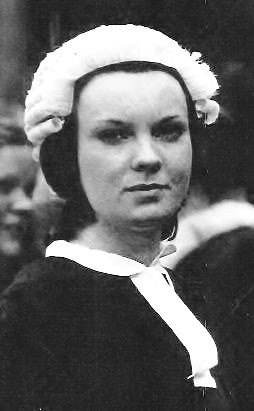
Emer Kilcullen
(Maire) Emer Kilcullen was called to the Bar on the 26th July 1972. She spent much of her career as a legal adviser in the Department of Foreign Affairs and was also a member of the Steering Committee for Human Rights on the Council of Europe. She is married to former High Court/Court of Appeal Judge John Hedigan.

Onora Ní Shúilleabháin
Originally educated in Loreto College Beaufort, Onora’s interest in law was triggered by the fact that her maternal grandfather had read law in Dublin in the early years of the twentieth century and she grew up in an atmosphere of lively debate at home, where participants needed legal precision to hold their own! Onora entered the civil service as an Executive Officer aged 17. She worked in the Central Office of the Four Courts and in the Probate Office whilst studying for her Bar examinations. She also undertook voluntary work with the Free Legal Advice Centre in her final year.
Onora received the John Brooke Scholarship for the highest overall marks in her Bar exams and was called to the Bar on the 26th July 1972. She sought the advice of a senior Judge at the time in relation to entering into practice as a barrister, but was told that women needed to be extremely tough to navigate the overwhelmingly male Bar Library and that her chances of success and a proper income were limited. On that basis, Onora elected to remain in the Civil Service but was required, on her subsequent marriage, to resign from her position due to the continuing Civil Service “marriage bar”.
Onora went on to have two children and her daughter Róisín (Peart) ultimately followed her into the legal profession and continues to practise today with a leading Dublin firm. Onora’s younger sister Clare, and her brother Terence, also followed her into the legal profession and Terence is a sitting judge of the Circuit Court. Onora subsequently revived her studies, going on to achieve a First Class Honours Bachelor of Arts in English and Art History, and is continuing her academic path with University College Dublin.
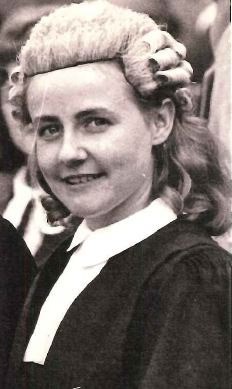
Mary Murphy
Mary entered the Civil Service in 1967 as an Executive Officer and was assigned to what was then called the Estate Duty Office. A requirement of this posting was undertaking to qualify as a barrister and Mary was duly called to the Bar in 1972, achieving First Class Honours in her final year. Mary continued her career within the Civil Service, eventually becoming a Principal Officer with the Revenue Commissioners. Her legal training was of great value in her work.
1973

Fidelma Macken
Fidelma Nora Macken (née O’Kelly) was born on the 28th February 1942. She was educated at Trinity College Dublin and the King’s Inns. When Averil Deverell died in 1979 she bequeathed one quarter of her estate to be devoted to the appointment of a lecturer in the Law School of Trinity. Fidelma Macken was the first recipient of this bequest, becoming the first Averil Deverell Lecturer in Law in Trinity.
She was called to the Bar in 1973, became a member of the Bar of England and Wales in 1987 and became a Senior Counsel in 1995. As a practising barrister she specialised in medical law and pharmaceutical actions and acted as defence counsel in a series of cases brought by children against whooping cough vaccine manufacturers.
She served first as a judge of the High Court from 1998 to 1999 and then as a judge of the European Court of Justice from 1999 to 2004, the first ever female appointee to that role. In 2005 she was appointed a judge of the Supreme Court of Ireland, a role she held until 2012.
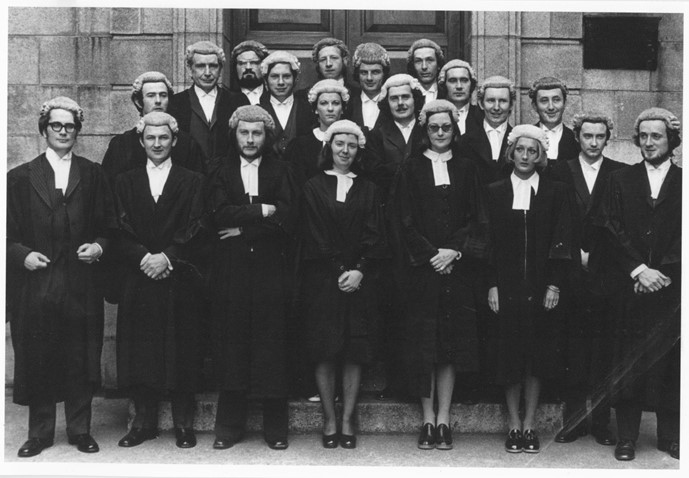
Mary Geraldine Miller
Called to the Bar on the 30th July 1973
Margaret McStay
Called to the Bar on the 30th July 1973.
Johanna Koorn
Called to the Bar on the 13th November 1973
Florence Kelly
Called to the Bar on the 13th November 1973.
Mary Iseult Averil MacMurrough Murphy
Called to the Bar on the 13th November 1973, Mary is still a practising member of the Bar.
Mary Rose Donaghy
Called to the Bar on the 13th November 1973.
Elizabeth Farquharson
Called to the Bar on the 13th November 1973.
Mary Gormley
Called to the Bar on the 30th July 1973

Yvonne Scannell
Honora Josephine Yvonne Scannell was born on the 5th July 1948 and was the 100th woman called to the Bar, on the 10th December 1973. She is a graduate of Trinity College Dublin and Cambridge University. After qualification she became a professor at Trinity College Dublin School of Law. She has written several books and numerous articles on Environmental and Planning Law and Constitutional Law. She has participated in the drafting of much international environmental legislation and she initiated the first ever proposal for the recognition of a human right of access to nature to the United Nations.
She is a leading campaigner for women’s rights and promoted the campaign for the removal of the punitive taxes on married women by providing the background research for the seminal Murphy Case which declared that tax unconstitutional. The Murphy Case went on to inspire the removal of many other financial discriminations against women.
Dr. Scannell has served on the Boards of Forfás, An Foras Forbartha, Habitat for Humanity, the Irish National Petroleum Corporation and on the Advisory Board of the EPA. She has also had a distinguished international career, elected a member of the European Council for Environmental Law, the International Court of Arbitration (Environmental Division) and Vice-President of the Nuclear Energy Agency.
She has been consistently nominated as one of Ireland’s leading environmental lawyers and has worked as in-house Counsel in Environmental Law for Arthur Cox since 1989.
Further Listening
If you enjoyed this online exhibition, you may be interested in our International Womens’ Day Discussion below, with former president of the UK Supreme Court, the Rt. Hon. The Baroness Hale of Richmond DBE in conversation with Emer Woodfull BL.